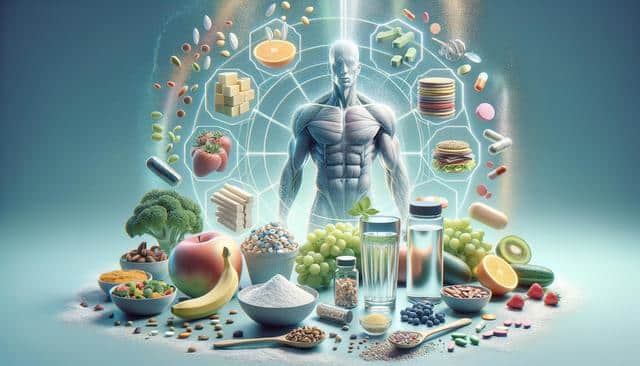
Fueling Strength: A Balanced Nutrition Plan for Muscle Growth and Recovery
Understanding the Role of Nutrition in Muscle Development
Muscle growth and recovery are not solely reliant on training—nutrition plays a central role in how effectively your body builds and repairs muscle tissue. To optimize results, your diet must supply the right balance of macronutrients and micronutrients to fuel workouts and support tissue repair. Protein is especially important, as it provides the amino acids necessary for muscle repair and synthesis. However, carbohydrates and fats also contribute by providing energy and supporting hormonal functions essential for recovery.
Without adequate nutrition, even the most intense training programs can fall short. Inadequate protein can slow down muscle repair, while insufficient calories may lead to muscle breakdown instead of growth. Understanding how different nutrients support your goals helps you make informed food choices that align with your training objectives.
High-Protein Foods for Muscle Repair
Protein is the foundation of any muscle-building nutrition plan. It helps repair microtears in muscle fibers caused by resistance training and stimulates muscle protein synthesis. Incorporating a variety of protein sources ensures you’re getting a full spectrum of essential amino acids, particularly leucine, which is crucial for initiating muscle growth.
Some highly rated protein sources include:
- Lean poultry and meats
- Eggs and egg whites
- Legumes and lentils
- Low-fat dairy products
- Plant-based proteins like tofu and tempeh
Timing your protein intake is also key. Consuming protein within 30 to 60 minutes after a workout helps maximize muscle repair. Additionally, spreading protein intake evenly across meals throughout the day supports continuous muscle recovery and growth.
Carbohydrates: Fueling Performance and Recovery
While protein gets a lot of attention, carbohydrates are equally important in a performance-focused nutrition plan. Carbs replenish glycogen stores depleted during workouts, providing energy for upcoming sessions and preventing fatigue. They also play a role in promoting an insulin response, which helps shuttle nutrients—including amino acids—into muscle cells more efficiently post-workout.
Incorporate a balance of complex and simple carbohydrates to maintain energy levels and support recovery. Some well-regarded carbohydrate sources include:
- Whole grains like oats and quinoa
- Fruits and vegetables
- Sweet potatoes and brown rice
- Low-fat dairy products with natural sugars
For optimal results, consume a carbohydrate-rich meal 1 to 2 hours before training and a mix of carbs and protein after your workout. This approach ensures your muscles are fueled and primed for recovery.
Healthy Fats and Their Role in Hormonal Balance
Fats often carry a negative reputation, but they are essential for hormone production, including those that regulate muscle growth like testosterone. Fats also support the absorption of fat-soluble vitamins such as A, D, E, and K, which are important for overall health and performance.
Include sources of healthy fats in moderation to support your muscle-building efforts. Outstanding fat sources include:
- Avocados
- Nuts and seeds
- Olive oil and flaxseed oil
- Fatty fish like salmon and mackerel
While fats are calorie-dense, they should not be avoided. Instead, focus on incorporating them into meals that already include protein and carbs, creating a balanced plate that supports sustained energy and metabolic health.
Micronutrients and Hydration: The Overlooked Essentials
While macronutrients often take center stage, micronutrients—vitamins and minerals—are equally crucial for muscle function and recovery. Magnesium helps with muscle contraction and relaxation, calcium supports bone health, and iron assists in oxygen transport. Not getting enough of these nutrients can lead to fatigue, cramps, or reduced performance.
To cover your micronutrient bases, aim to eat a variety of colorful fruits and vegetables daily. Including leafy greens, berries, citrus fruits, and cruciferous vegetables ensures a diverse nutrient intake.
Hydration also plays a pivotal role. Water supports nutrient transport, regulates body temperature, and aids in muscle recovery. Dehydration can significantly impair performance and delay recovery. Be sure to:
- Drink water consistently throughout the day
- Replenish fluids lost during workouts with water or electrolyte-enhanced beverages
- Monitor urine color—it should be pale yellow
By prioritizing both micronutrients and hydration, you can enhance the effectiveness of your overall nutrition plan and promote better recovery outcomes.
Conclusion: Building a Sustainable Plan for Strength and Recovery
For athletes and fitness enthusiasts, a well-rounded nutrition plan is key to unlocking muscle growth and speeding up recovery. By focusing on high-quality protein intake, strategic carbohydrate consumption, healthy fats, and adequate micronutrients, you can create a sustainable approach that supports long-term strength and performance goals. Remember, consistency matters more than quick fixes. Small, daily nutritional choices contribute to lasting results, helping you stay energized, recover faster, and continue progressing in your training journey.


